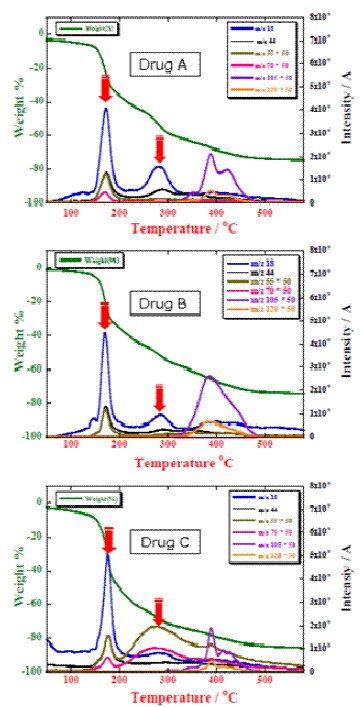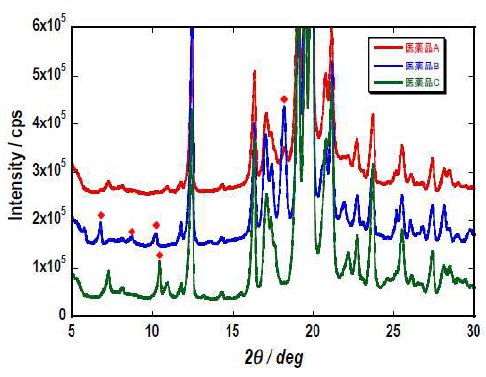Application Note TA6005
Introduction
We perform comparative analysis for three over-the-counter (OTC) products. Even if the main components of the drugs are same, the drugs occasionally become different due to other factors such as diluent base, preservation agent and manufacturing process. In rare cases, it should be possible to consider the pure grade of the main components. We can observe minute differences between three over-the-counter products by analyzing the detail of thermal cracking process for drugs in inert atmosphere using the combination of thermogravimetry (TG) and mass spectrometer (MS).
Instrument: ThermoMass Photo
ThermoMass Photo is an evolved gas analytical system designed for real-time simultaneous measurements of thermogravimetry – differential thermal analysis (TG-DTA) coupled with electron impact ionization (EI) and the fragment-free photoionization (PI) mass spectrometry (MS) that performs measurements as a function of temperature or time.
Measurement and analysis
A comparison between the results from over-the-counter drug A, two types of medicinal drug B and C, major component is loxoprofen sodium hydrate for anti-inflammation and painkiller, employed TG-MS is shown in Figure 1.
These mass spectra show that the evolved gas species were characterized by the m/z 18, 55, 70, 105 and 120 ions which indicate decomposition components of drug. While the TG measurement results show three steps of mass losses. When look over each drug, the decomposition component of drug A can be observed two steps of dehydration (m/z 18) at 156℃ and 280℃ while generated CO₂ (m/z 44) at 285℃.
On the other hand, the second step of dehydration of drug B, the dehydration peak intensity decreased and generated CO₂ were became less. Furthermore, the drug C, there was observed the evolved gas species characterized by m/z 55 and 70 ions prominently, instead of no peak intensities of dehydration at the second step and CO₂.
We assume that these difference of decomposition components due to the difference of diluting agents. From measurement results reveal that the difference of decomposition components were characterized clearly which measuring evolved gas of mass by the mass analyzer while the difference of decomposition reactions can not distinguish by TG.

Figure 1: Comparison of TG-MS curves and mass spectra for OTC drugs
Supporting documentation
Comparison analysis of XRD data for OTC drugs
A comparison between XRD data profiles of three drugs is shown in Figure 2. The observed diffraction peaks exhibit small difference for those drugs. These difference might originate in crystal polymorphs or components (see ◆ points).
 Figure 2: Comparison of XRD profiles curves for OCT drugs, red line for drug A, blue line for drug B and green line for drug V
Figure 2: Comparison of XRD profiles curves for OCT drugs, red line for drug A, blue line for drug B and green line for drug V
XRD measurement condition
| X-rays | Cu/40 kV/50 mA |
| Counter | D/teX Ultra |
| Divergence slit | 1/2° |
| Scan speed | 10.0°/min |
| Sampling width | 0.01° |
| Scan axis | 2θ/θ |
| Scan range | 5.0 ~ 30.0° |

